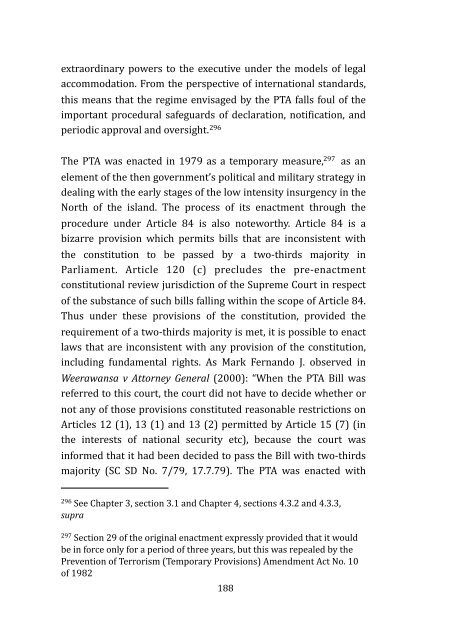States of Emergency - Centre for Policy Alternatives
States of Emergency - Centre for Policy Alternatives
States of Emergency - Centre for Policy Alternatives
Create successful ePaper yourself
Turn your PDF publications into a flip-book with our unique Google optimized e-Paper software.
extraordinary powers to the executive under the models <strong>of</strong> legal<br />
accommodation. From the perspective <strong>of</strong> international standards,<br />
this means that the regime envisaged by the PTA falls foul <strong>of</strong> the<br />
important procedural safeguards <strong>of</strong> declaration, notiLication, and<br />
periodic approval and oversight. 296<br />
The PTA was enacted in 1979 as a temporary measure, 297 as an<br />
element <strong>of</strong> the then government’s political and military strategy in<br />
dealing with the early stages <strong>of</strong> the low intensity insurgency in the<br />
North <strong>of</strong> the island. The process <strong>of</strong> its enactment through the<br />
procedure under Article 84 is also noteworthy. Article 84 is a<br />
bizarre provision which permits bills that are inconsistent with<br />
the constitution to be passed by a two‐thirds majority in<br />
Parliament. Article 120 (c) precludes the pre‐enactment<br />
constitutional review jurisdiction <strong>of</strong> the Supreme Court in respect<br />
<strong>of</strong> the substance <strong>of</strong> such bills falling within the scope <strong>of</strong> Article 84.<br />
Thus under these provisions <strong>of</strong> the constitution, provided the<br />
requirement <strong>of</strong> a two‐thirds majority is met, it is possible to enact<br />
laws that are inconsistent with any provision <strong>of</strong> the constitution,<br />
including fundamental rights. As Mark Fernando J. observed in<br />
Weerawansa v Attorney General (2000): “When the PTA Bill was<br />
referred to this court, the court did not have to decide whether or<br />
not any <strong>of</strong> those provisions constituted reasonable restrictions on<br />
Articles 12 (1), 13 (1) and 13 (2) permitted by Article 15 (7) (in<br />
the interests <strong>of</strong> national security etc), because the court was<br />
in<strong>for</strong>med that it had been decided to pass the Bill with two‐thirds<br />
majority (SC SD No. 7/79, 17.7.79). The PTA was enacted with<br />
296<br />
See Chapter 3, section 3.1 and Chapter 4, sections 4.3.2 and 4.3.3,<br />
supra<br />
297<br />
Section 29 <strong>of</strong> the original enactment expressly provided that it would<br />
be in <strong>for</strong>ce only <strong>for</strong> a period <strong>of</strong> three years, but this was repealed by the<br />
Prevention <strong>of</strong> Terrorism (Temporary Provisions) Amendment Act No. 10<br />
<strong>of</strong> 1982<br />
188











